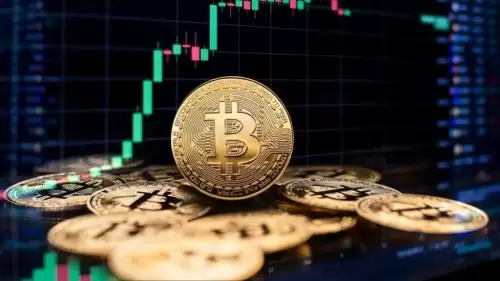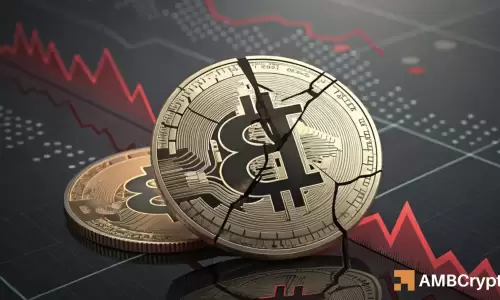 |
|
 |
|
 |
|
 |
|
 |
|
 |
|
 |
|
 |
|
 |
|
 |
|
 |
|
 |
|
 |
|
 |
|
 |
|
Articles d’actualité sur les crypto-monnaies
A Technical Decision Is Causing Waves in the Bitcoin Community
May 06, 2025 at 10:05 pm

A technical decision by Bitcoin Core developers is stirring up the community, as it marks a change in the protocol’s core. For a long time, a limit of 80 bytes on the OP_RETURN field has prevented users from storing too much data in transactions, an action that was meant to remain light and discreet. However, today this symbolic barrier is seen as pointless and might even have had counterproductive effects.
This technical adjustment is heating up community discussions as it undermines the role of a few technical teams in making decisions that do not necessarily align with the collective interest.
A Rule That Has Become Counterproductive
OP_RETURN allows including data in a transaction without generating an UTXO. Introduced to avoid polluting scripts, it was a compromise: limited freedom for maximum security. The 80-byte limit aimed to deter large-scale content storage.
However, users quickly found ways to circumvent this rule. Some inserted their data via fake multisig scripts or used fake addresses, ultimately generating even more pollution.
Moreover, some miners disregarded this limit, rendering its application inconsistent.
As Greg Sanders, a Bitcoin Core developer, pointed out in the PR 32359 proposal on GitHub, "people are going to inscribe data regardless, and if they are limited to 80 bytes of OP_RETURN, they will use even worse and more opaque techniques to do so."
Thus, removing this limit appears to be a pragmatic choice, especially since the developers' philosophy is minimal interventionist:
"The fee market should decide what kinds of transactions get included in blocks and what uses of the Bitcoin protocol are valuable enough to pay for. We prefer to leave as much as possible to the market forces and not create new, technical limits on the protocol."
Of course, this does not mean that there will be no protection against abuse. But it will be targeted and adapted to real threats, in accordance with the project's direction: to avoid abuses while streamlining the protocol.
This change is therefore neither a revolution nor an abandonment of principles. It is a technical realignment with the network's actual practice.
Voices Rise Against the Change
This decision does not come without protest. For many users, this change was not discussed sufficiently and imposes technical choices without collective consent.
As Marty Bent, a prominent figure in the community, points out on X, "It’s clear that there is no consensus today on the OP_RETURN question."
On his side, Samson Mow calls for caution and invites those who disagree with this decision to remain on version 29.0 of Bitcoin Core or use another client like BitcoinKnots.
Indeed, the heart of the problem is this: who changes Bitcoin and how? Some denounce a gradual shift towards centralized governance, dominated by a few technical teams. The PR 32359 proposal, though discussed on GitHub, lacked community consultation.
This disagreement shows how fragile protocol governance remains. Users are not all ready to follow imposed changes, even when they seem logical.
What It Really Changes
Behind this technical quarrel, there are concrete implications for the network:
This change is a technical adjustment to the protocol, aiming to streamline it and leave more room for innovation. It also minimizes the intervention of Bitcoin Core developers in the types of transactions that miners select for inclusion in blocks.
The 80-byte limit on the OP_RETURN script was introduced in 2012 with the goal of preventing users from storing large amounts of data in transactions, an action that was meant to remain light and discreet. However, over time, this limit began to be seen as pointless and might even have had counterproductive effects.
As usage patterns evolved, the 80-byte limit began to be circumvented in various ways. For instance, some users began to insert their data via fake multisig scripts or used fake addresses, ultimately generating even more pollution.
Moreover, some miners ignored this limit, rendering its application inconsistent.
This technical decision might be minimal, but it is nonetheless part of a broader shift in the Bitcoin ecosystem.
Clause de non-responsabilité:info@kdj.com
Les informations fournies ne constituent pas des conseils commerciaux. kdj.com n’assume aucune responsabilité pour les investissements effectués sur la base des informations fournies dans cet article. Les crypto-monnaies sont très volatiles et il est fortement recommandé d’investir avec prudence après une recherche approfondie!
Si vous pensez que le contenu utilisé sur ce site Web porte atteinte à vos droits d’auteur, veuillez nous contacter immédiatement (info@kdj.com) et nous le supprimerons dans les plus brefs délais.
-

- Velo Universe, Dex et Defi Security: naviguer dans l'avenir du trading décentralisé
- Aug 05, 2025 at 07:45 am
- Exploration de l'évolution des échanges décentralisés (DEX) en mettant l'accent sur l'univers Velo, la sécurité Defi et la transition vers des plateformes de trading transparentes centrées sur l'utilisateur.
-

- Le portefeuille Bitget révolutionne Solana avec des transactions sans gaz: une nouvelle ère pour Defi
- Aug 05, 2025 at 07:36 am
- Bitget Wallet conduit la charge pour rendre Solana plus accessible avec des transactions sans gaz, simplifiant Defi pour tout le monde. Découvrez comment cette innovation remodèle l'expérience utilisateur.
-

- Ozak Ai, Boom crypto et potentiel de retour sur investissement: est-ce la prochaine grande chose?
- Aug 05, 2025 at 07:30 am
- Plongez dans le potentiel d'Ozak Ai dans le boom de la cryptographie. Ses outils commerciaux alimentés par l'IA peuvent-ils fournir un retour sur investissement explosif? Nous explorons les tendances et les idées.
-

- Les ETF de Solana et la poursuite de tous les temps High: Sol est-il défini sur Soar?
- Aug 05, 2025 at 07:30 am
- Le buzz de Solana est de retour! La spéculation du FNB, la croissance du réseau et la manie de la pièce mème pourraient pousser Sol vers un nouvel ATH. Mais y a-t-il d'autres joueurs dans le jeu?
-

-

-

-

- Bitcoin, Michael Saylor et Stratégie: un mastodonte de transformation numérique
- Aug 05, 2025 at 07:01 am
- Explorez la stratégie de Bitcoin audacieuse de Michael Saylor, les avoirs massifs de Microstrategy et le paysage évolutif de l'adoption de la cryptographie d'entreprise. Wall Street se fait-il enfin?
-

- Les détenteurs de Bitcoin se préparent à la sortie du marché au milieu des signaux baissiers
- Aug 05, 2025 at 07:00 am
- Les détenteurs de bitcoins à long terme montrent des signes de sortie du marché en tant que statistiques clés flash les signaux baissiers, suggérant une correction potentielle malgré des prix élevés.





























































